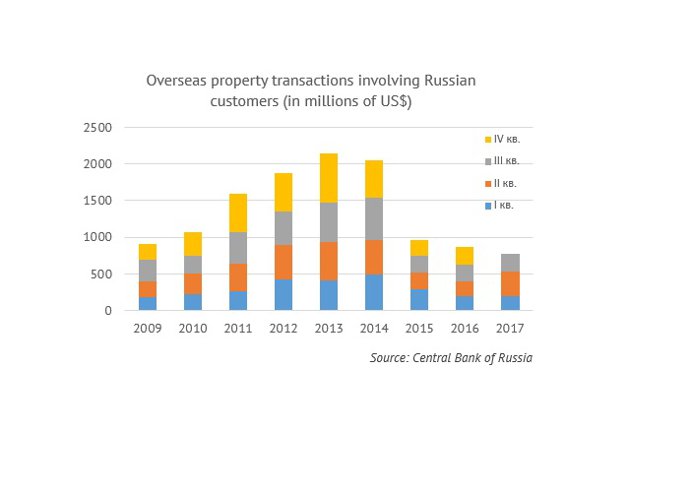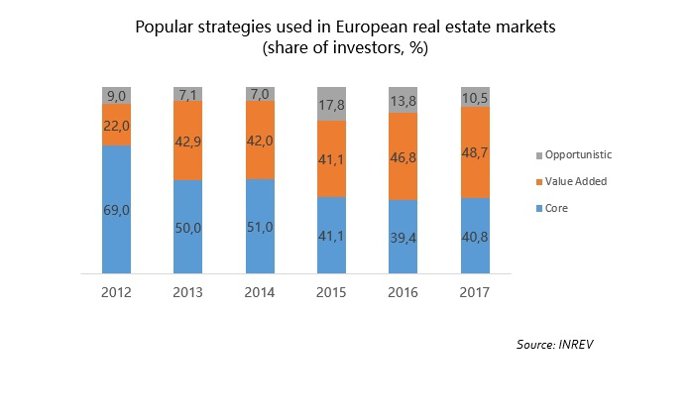Changes in the behaviour of Russian property investors in 2017
In 2017 the Russian investment market started to recover from the crisis triggered by the devaluation of the ruble between 2014 and 2015.
According to the Russian Central Bank, between 2015 and 2016, the amount of money transferred from the Russian Federation to pay for operations relating to overseas real estate transactions fell by almost two times compared to the 2013–2014 period. However, there was a 25% increase in money transferred during the first three quarters of 2017 compared to the same period in 2016 (up to $775 million). The total investments made in 2017 are expected to exceed those made in the previous two years.

Germany is a top priority
According to a survey conducted by CBRE (EMEA Investor Intentions Survey 2017), Germany is the most popular country for investment in profit-generating real estate: 22% of respondents were planning to invest in property located in Germany in 2017. The second most popular country is Great Britain, which was chosen by 20% of respondents.
Tranio’s experience confirms this trend: between January and November 2017 the company received 70% more enquiries for German properties compared to the same period in 2016.
According to Savills, €26 billion was invested in Germany’s commercial property market in the first half of 2017. This is a 41% increase compared to the same period in 2016 and a record high for the past 10 years. Analysts expect that in 2017, investments will exceed €60 billion to reach an all-time high.
Russians are also showing an increased interest in German real estate. According to Russian search engine Yandex, the number of related queries increased by 8% between January and November 2017 compared to the same period in 2016.
Russian investors are mainly interested in rental property in Germany. There is a high demand for rental housing (about 50% of the population rent apartments), banks offer low mortgage rates (from 1.5% per annum), and real estate prices have been constantly growing (by an average of 8% annually between 2011 and 2017). Investors are also attracted by the country’s economic and political stability.
Growing demand for value-added projects
Russians, who began investing in overseas real estate 3–5 years ago, are now starting to invest in value-added projects, which can be described in three words: buy, fix, sell. The trend to transit from a simple to a more complex strategy is typical for investors around the world.
According to a survey conducted by the European Association of Investors in Non-Listed Real Estate Vehicles (INREV), the share of overseas investors who prefer a value-added strategy has more than doubled, growing from 22% to 49% between 2012 and 2017. At the same time, the share of those who chose a rental business (Core) fell from 69% to 41%.

Value-added projects are interesting for investors because they can generate a higher yield compared to the steadily declining profitability of regular rental properties in European markets in recent years. Most Russians expect a 4–8% yield from rental properties, while the value-added projects are expected to generate 10–20% per annum.
In recent years, Russian investors have been actively building their own teams and carrying out more development projects around the world than ever. Large construction projects are being launched in the United Kingdom, Vietnam, Germany, United States, Czech Republic and other countries.
For example, according to PR Newswire, in February 2016 it became known that Elena Baturina, the wife of the former mayor of Moscow, launched a development project in New York and registered a commercial property that costs $10 million with her company.
Another construction project in New York City is at 262 Fifth Avenue, which is being developed by Five Points Development LLC, a company founded by Russian-Israeli billionaire Boris Kuzinez. According to RBC, the project is being designed by Russian architecture firm Meganom and approved by New York City’s authorities in autumn 2017.
According to Russian news agency RIA Realty, in autumn 2017, the Osnova Group (a conglomerate of Russian construction companies) announced its plans to invest €160 million in development projects in Germany and the Czech Republic.
Catering to such demands, Tranio is involved in a number of development projects in the Spain, Germany and Greece real estate markets, which have a total floor area of 15,000 square metres and €20 million in investments. The company is focusing on residential real estate, student apartments and apartment hotels.
More experienced investors
Overall, Russian investors are more experienced. This is due to a global market environment and changes in the legislation of the Russian Federation.
The placement of capital in the United States and Europe has become more complicated, and baking compliance is getting tougher. Investors are finding it increasingly difficult to prove the legality of the origin of their funds.
In 2018, the agreement on the automatic exchange of financial information (CRS MCAA) will become effective in Russia. Russian tax authorities will receive information on bank accounts opened by Russians abroad and, indirectly, on the assets of Russian nationals. According to a survey conducted by Tranio, about 40% of Russians who hold accounts with foreign banks informed Russian tax authorities after the Russian Federation signed the agreement, and about 10% did so before.
In addition, various legislative instruments (in particular, the law on controlled foreign companies (CFC) make tax optimisation more expensive. More and more customers are thinking about properly structuring transactions involving foreign real estate and legal ways to reduce their tax burden. According to the same survey, the majority of Russians who do not want to declare their foreign assets are changing their fiscal residency, with Cyprus and Great Britain the most popular destinations for this purpose.
What’s next?
Most likely, the number of Russians who invest in overseas profit-generating property will remain high for years to come. Russians will continue to invest in rental property in Germany and real estate assets in other hot markets in the United Kingdom and the United States. However, as these markets are already overheated, the demand for value-added projects will grow in locations that have price growth potential, for example, in Greece, particular property in Athens.
Investors will gradually become more interested in Asian real estate markets, Vietnam and Thailand in particular. At the same time, new investment tools will become more popular. They include:
- Crowdfunding platforms: Internet platforms for collective investments that allow individuals with little capital to enter the property market.
- Alternative investment methods: real estate asset-backed securities, participation in funds, mezzanine loans (loans issued in exchange for an interest charged for the use of funds and portion of the project revenues).
- Generating revenues with the help of professional managers who will handle all issues related to real estate investment.
Originally published on realty.rbc.ru
We will send you a content digest not more than once a week
